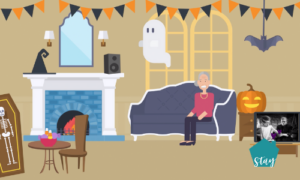Understanding Halloween and Dementia: Importance of Extra Care
 It is important to pay extra attention to those living with dementia, especially during the holidays when their normal lifestyle may be disrupted. If changes are noticed, try identifying the items or situations that you feel could be the issue and remove them. Some examples of changes in behavior would include sleep changes, anxiety, agitation, wandering (as this can be a sign they are looking for a quieter, less busy, or scary place), or saying things like “I want to go home” or “I want my mother”.
It is important to pay extra attention to those living with dementia, especially during the holidays when their normal lifestyle may be disrupted. If changes are noticed, try identifying the items or situations that you feel could be the issue and remove them. Some examples of changes in behavior would include sleep changes, anxiety, agitation, wandering (as this can be a sign they are looking for a quieter, less busy, or scary place), or saying things like “I want to go home” or “I want my mother”.
Creating a Dementia-Friendly Halloween Experience
Decorations
Decorations and costumes can be confusing for someone living with dementia. Regardless if the decorations are realistic looking or obviously fake, those living with dementia may view what they see as real. Consider avoiding decorations with flashing lights, moving parts, and loud noises. Also be aware of any small decorative items that can be eaten, as they pose a serious choking hazard.
Unsupervised Candy
Leaving candy unsupervised can also be a choking hazard or cause issues with people wearing dentures. People living with dementia may forget that they have already eaten candy and may overindulge, which can be particularly troublesome for those who are diabetic. In turn, on Halloween night, a person living with dementia should not hand out candy alone, as it could threaten their own safety or scare and overwhelm them because of all the trick-or-treaters.
Monitoring TV Watching
Shows or movies on TV can be misinterpreted as being real and should be closely supervised. You may want to eliminate scary movies and even news coverage that shows people dressed in costumes. Alternatively, consider playing soft, soothing music that they are familiar with and doing activities that are part of their normal life. Try as much as possible to make life the same as it always is.
Trick-or-Treaters
Having strangers coming to the house in costume may cause agitation and confusion among those with dementia. For most, it is probably best to avoid trick-or-treaters. Consider turning off the porch light, so people are not encouraged to come to the door. You could also put a note on the door or over the doorbell asking people not to ring or knock, but leave a bowl of candy on the porch with a sign to help themselves. For some seniors with dementia, you may want to consider arranging for them to visit another loved one in a more remote and quieter place.
Let Them Enjoy
For many people, Halloween can bring back fond memories of early times. Activities such as carving pumpkins, decorating the house, and wearing costumes can all be fun pastimes for them to enjoy. If the individual living with dementia still enjoys the holiday, allow and even encourage them to participate. Just be sure to keep a close eye on them and look for any signs of agitation, anxiety, or other sudden changes in behaviors.







